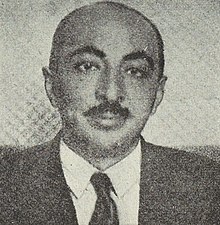This article needs additional citations for verification. (February 2022) |
Ibrahim Nagi (Arabic: إبراهیم ناجي) (December 31, 1898 – March 27, 1953) was an Egyptian polymath; a poet, author, translator, and practicing medical doctor. He was among the contributors of Al Siyasa, newspaper of the Liberal Constitutional Party.[1]
Ibrahim Nagi | |
|---|---|
 Ibrahim Nagi | |
| Born | December 31, 1898 Cairo, Egypt |
| Died | March 27, 1953 (aged 54) Cairo, Egypt |
| Occupation | Poet, Medical Doctor |
| Language | Arabic |
| Nationality | Egyptian |
| Literary movement | Neo-romanticism, "Apollo Sociaty" |
Early life
editNagi was also a doctor in internal medicine. Nagi's most famous poem is Al-Atlal or The Ruins which was eventually sung by Egyptian singer Om Kalthoom. He was a co-founder of the Cairo "Apollo Society" for Romantic Poetry. He married Samia Sami and had three daughters: Amira (who had a daughter, Samia Mehrez, and a son, Mohammed), Dawheya (who went to live in America and had a son- Ahmad, and a daughter- Shahira), and Mohassen.
Bibliography
edit- Behind the Fog, 1934.
- In the Temple of the Night, 1948.
- Cairene Nights, 1951.
- The Bird Wounded, 1953.
The legacy of Ibrahim Nagi in the literary studies
editThe poetry of Ibrahim Nagi is an object of studies of several literary critics. Nagi's legacy was noted by Abdul Rahman Ghazi al Gosaibi, Hasan Tawfiq and Saleh Jawdat.
References
edit- ^ Arthur Goldschmidt Jr. (2013). Historical Dictionary of Egypt (4th ed.). Lanham, MD: Scarecrow Press. p. 388. ISBN 978-0-8108-8025-2.
External links
edit